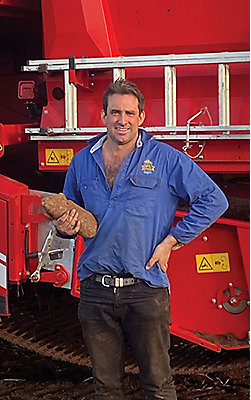“About seven years ago I was working full time in Victoria and had a lifestyle property in Penguin when my neighbour, who knew I was really keen to have some ground – her husband passed away unexpectedly,” Robert said.
“She gave me the opportunity to take on management of their hundred acres and that kickstarted everything. She gave me a lease that I paid in arrears instead of in advance and that’s what got everything going.”
Since that time, diversification and collaboration have driven the growth and success of West Pine Ag.
“I don’t think I can point to anyone in our industry that hasn’t built a business without collaboration with other businesses or intergenerational wealth,” he said.
“You have to develop a diverse skill set and operation to succeed unless you’ve inherited a sizeable portion of land and water to attract lenders.
“There’s amazing young people all over the country that I think would make a huge impact but can’t enter primary production – and it’s something that needs to be addressed.”
In addition to producing vegetables, West Pine Ag operates a retail store in Penguin and has led a project to build a large plant in Victoria which repurposes a by-product from a baking yeast facility to create fertiliser and stock feed.
Sustainability at the heart of growing
Robert said West Pine Ag has been built with the United Nations’ Sustainable Development Goals in mind and the concept of the “triple bottom line”: profit; people; and planet.
“At the moment we are going through the baselining process to understand our own carbon impact,” he said.
The company is also focussing on reducing waste, a project using crop residues for bioenergy, improving energy efficiency by installing automated irrigation systems, and baselining electricity and diesel consumption.
Robert said the ultimate goal was to become carbon neutral but also to provide a heightened level of transparency to consumers.
“We’d like a mechanism in place that enables full visibility of the impact of our supply chain,” he said.
“So, when you purchase something that’s grown by our farm, or by our industry, you can make a really informed decision over the value of locally grown Australian produce, down to the quality of the water, or how we pay our people fairly, things like that.”



